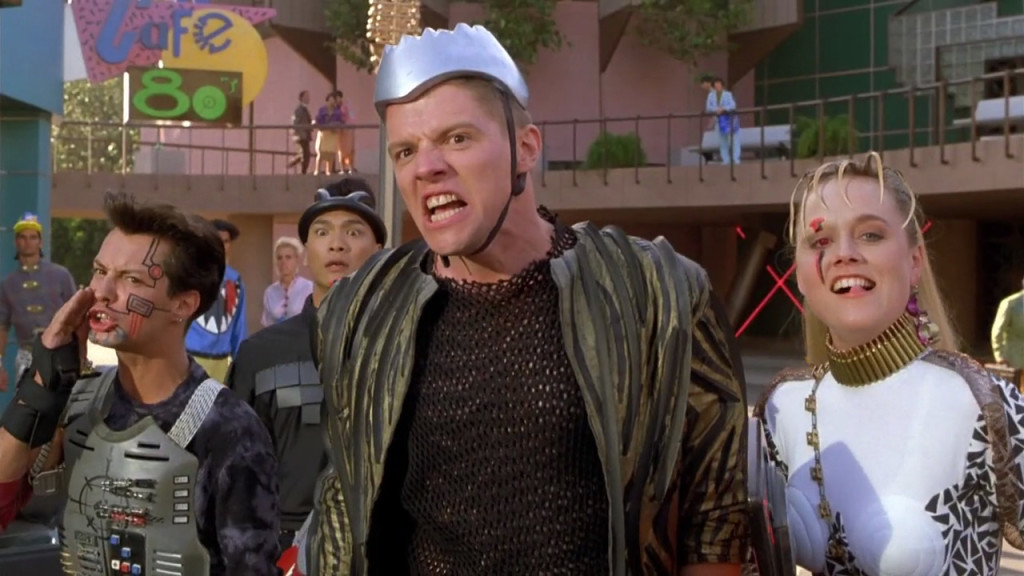The schizophrenic 2015 Summer box office refuses to go away! Neither of this weekend’s contestants, Terminator: Genisys or Magic Mike XXL, finished in the top two. Those spots went to stellar holdovers Inside Out and Jurassic World. The studios responsible for the new entries, Paramount and Warner Brothers, are trying to blame a weird July 4th weekend layout (where July 4th didn’t fall on a weekday), but come on, let’s be honest here. Nobody wanted to see these films because of a simple reason: they didn’t look that good.
I mean Terminator: Genisys did so bad, it finished 20 million dollars below Terminator: Salvataion’s opening weekend box office, a movie that famously found a way to make a post-apocalyptic world dominated by killer robots boring. What’s strange is that every single person on the planet knew this movie was dead in the water EXCEPT for the Terminator producers and Arnold Schwarzenegger. How can a group of people be so out of touch?
Well, I have a counter-argument for that. I believe that if the script for Terminator: Genisys was good, and that script translated into a good film, word-of-mouth and slamming reviews could’ve saved this film. So why didn’t that happen?
Well, the writers of Terminator: Genysis made an age-old screenwriting mistake. They wrote a complicated time travel story. I’m going to say something here that I BEG all sci-fi writers heed for the remainder of their writing careers: COMPLICATED MAINSTREAM TIME-TRAVEL MOVIES DO NOT WORK.
Time travel is one of the trickiest sub-genres to get right. That’s because they intrinsically don’t make sense. If you travel back in time to stop something and it doesn’t work, you just travel back and try it again. The genre is a black hole for plot holes. And the more you keep travelling around in time, the more of these plot holes keep popping up.
Terminator: Genisys is all about characters travelling back in time to stop moments from previous Terminator timelines. Like an aging Arnold Terminator growing up with Sarah Connor and then fighting his younger Terminator self when he shows up in 1984.
This is a DEADLY but common mistake with young eager sci-fi writers. They say, “Ooh, that’d be so cool. The old Terminator fighting the young Terminator when he arrives in the past!” And it is kind of a cool idea. But if you manipulate a time-travel timeline that’s already iffy as it is solely to accommodate a cool scene, you’ve upset the entire foundation of your story.
When you write anything, whether it’s a complex time-travel plot or a simple coming-of-age film, you must avoid “But wait” moments. “But wait” moments are where your audience pulls out of the movie to ask, “But wait. If that happens, then the other thing doesn’t make sense.” Or, “But wait. If he did this then how come he couldn’t do it earlier?” Time travel movies are cess pools for “But wait” moments.
For that reason, when you write a time travel movie, you keep the time travel stuff as simple as possible. It’s why the original Terminator worked so well. A terminator came back from the future to kill a woman. The whole movie, then, was not about Sarah Conner jumping through time portholes to escape the Terminator. It was a chase movie. Plain and simple. No gimmicks. That’s why it worked.
James Cameron knew this going in for the sequel as well. He didn’t add some silly time-travel plot. The only thing he changed was adding a new Terminator. There was some stuff about trying to destroy Skynet before it could take over the world, but that was still easy to understand and buy into.
Another example of time travel screwing up a movie was Back to the Future 2. Now I can already hear some of you guys grumbling. “Back to the Future 2 was great, Carson!” No, it wasn’t. The plot was borderline ridiculous. What you liked about Back to the Future 2 (as did I) was that it still had 2 of the most lovable characters in cinematic history, Marty McFly and Doc Brown. Those two are what made Back to the Future 2 watchable.
But the travelling to the future only to find out that they needed to travel to the past to save an alternate present. It was a mess. And I remember Roger Ebert pointing out that even the characters looked confused trying to explain it (needing a chalkboard to do so). And this is yet another reason to avoid complicated time travel movies. They require tons of exposition, which eats up valuable story time.
Now some of you might point out movies like Primer as examples of complicated time travel movies that work. But Primer isn’t a mainstream movie. It’s a $7000 indie movie that nobody outside of cinephiles saw and when you make a movie for that kind of money for that kind of audience, you can take risks and play around because you’re not necessarily required to make sense (and it’s debatable whether Primer does make sense).
My point is, time-travel is a plot device that you can get lost in. And I get it. It’s fun to play with. Who doesn’t want to solve a time travel problem by adding more time travel! But I’m warning you as someone who reads A LOT OF BAD TIME-TRAVEL SCRIPTS, if you’re writing a sci-fi movie, it’s best to keep the time-travel plot as simple as possible. You can be complex with character development and the plot itself. But don’t add layers upon layers of time travel unless you want to “But wait” yourself out of a movie.
Speaking of time travel, I bet the producers of Magic Mike XXL are wishing they could go back in time and not make their sequel.
Granted, my understanding of why this movie didn’t work isn’t as complete as Terminator: Genisys, but I have some ideas. For starters, this isn’t a sequel-type movie. Sequel movies are action movies, adventure movies, sci-fi movies, and comedies. There’s nothing about this particular concept that screams “need more of these.” It feels very much like a “one-off.”
The producers didn’t seem to realize this and that cost them. Because even without that issue looming, sequels need to abide by one law. You need to give the audience MORE. Something bigger. And when you watched the Magic Mike XXL promos, it looked like we were getting the same.
This was the same mistake The Avengers 2 made, which isn’t coming anywhere near the domestic box office of the original. They went as big as they could in the original, leaving them no room to go bigger with the sequel. So people said, “That looks the same.” And it was. It was the same movie (probably even smaller). And that’s death for a sequel.
Using Terminator as an example here, Terminator 2 brought in a bigger badder Terminator. That’s why people showed up to that movie. Because we were getting something new. Magic Mike should’ve realized, “We aren’t a typical sequel film. So we definitely need to find something bigger to bring people in.” I don’t know what that would be. The promise of Channing Tatum full-frontal? Based on the audience for the film, maybe. But a carbon-copy stripper film isn’t going to be enough to lure people to theaters.
Unfortunately, next week doesn’t look much better. Minions is the only major film opening. But the following week we get Ant-Man AND Trainwreck, so that should be fun. And remember, screenwriters – following and dissecting box office is an essential part of your jobs. You need to know what’s doing well and what isn’t, and also WHY. Studios are fickle and terrified and reactionary and one major bomb in a genre can change the development tracks of all six studios. For example, you don’t want to go out wide with your complicated time-travel stripper script this week. Table that for awhile and work on something else. Like dinosaurs attacking Los Angeles or something. I’m only half-kidding. It’s not like Jurassic Park has IP on dinosaurs. Man, the more I think about it, the more I think a studio would actually buy that. Anyway, as always, good luck!




